On January 18th, the Permanent Missions of Japan, Poland, and Turkey to the United Nations, in cooperation with the Stimson Center, convened a conference on proliferation challenges in a flat world.
The event was the fourth in a series of roundtable discussions on non-proliferation and disarmament. The first two seminars focused on nuclear weapons proliferation and disarmament instruments and tools, while the third centered on the equally menacing conventional arms trade. The most recent installment of the Turtle Bay roundtable, however, concentrated on the issues of sanctions and non-proliferation of both WMDs and conventional weapons, with the intention of examining what challenges proponents of non-proliferation face in a globalized world (the agenda of the event can be found here).
Over 150 participants, including representatives from over 55 UN Member States as well as leading experts from relevant fields, joined the seminar. Other attendees of note included several academics from leading universities and think tanks, as well as experts from pertinent Security Council Committees, such as the 1540 Committee on non-proliferation, the 1718 Committee on North Korea and the 1737 Committee on Iran. Such a high turnout and the lively discussion that ensued can be perhaps explained by the fact that the meeting was co-hosted by Japan, Turkey, and Poland, three missions that have been steadfastly dedicated in multilateral non-proliferation efforts known as the Non-Proliferation and Disarmament Initiative (NPDI). As it combined input from Member States, academics, and experts, the seminar also featured a frank, cross-cutting and open discussion not often found at other UN meetings.
The event started with the opening remarks made by Ms. Ellen Laipson, President and CEO of Stimson, and Ambassador Tsuneo Nishida of Japan, Ambassador Halit Ҫevik of Turkey, and Mr. Paweł Herczyński of Poland, Deputy Permanent Representative of Poland (Ambassador Nishida’s remarks can be found here). Experts from think tanks and UN panels then began the first panel by examining the impact of the diffusion of illicit weapons on human security and economic development. The panelists discussed the linkages between the proliferation of weapons of mass destruction and conventional weapons. Participants pointed out that while there exist differences between the two modes of illicit transfers of goods and materials, the profits gained from trafficking of conventional arms and other contrabands are frequently used to finance other programs, most notably secret nuclear and other WMD development programs. During the interactive portion of the panel, many participants stressed the importance of sharing information so that necessary investigations and preventions measures could be implemented for states facing serious resource constraints. In this regard, participants stressed the important role that civil society, think tanks and the private sector play in identifying the proliferation of weapons, dual use materials and technologies.
The second panel also discussed the pattern of globalized proliferation, but with much more emphasis on specific patterns of sanctions evasions and illicit pattern of transfers. One panelist believed that industries are crucial partners and the best lookouts, and that more government cooperation with them could yield better industry responses. Another panelist remarked that one of the consequences of globalization has been the shift towards “containerization”, meaning that often smugglers can easily evade traditional custom searches. To counteract this new trend, the panelist suggested that customs authorities operate on a risk assessment model, instead of relying on intelligence-based seizures and interdictions. Panelists also pointed out that there seemed to be an international consensus on the goal of nonproliferation, but a wide difference of opinions of the means, especially regarding how intrusive Sanctions Committees and their panels can be. One participant noted the importance of sharing long-term objectives of non-proliferation. The audience also raised the need to search for a way to better align disarmament and non-proliferation goals with incentives for industry so that they could do more than what was legally required.
In the afternoon session, Ms. Angela Kane, UN High Representative on Disarmament Affairs, gave remarks on behalf of Secretary-General Ban Ki-Moon (The full text of the Secretary-General’s message can be found here). The Secretary-General deplored the huge social and economic losses caused by proliferation and once again noted the need for an international legal regime to regulate the conventional weapons trade.
Juan C. Zarate, a Senior Adviser at the Center for Strategic and International Studies and the Senior National Security Analyst for CBS News, then gave the keynote address and discussed five areas of innovation that partners could use to tackle the “ecosystem” of problems relative to nonproliferation. The first would be to focus on sanctions evasion, as it forces accountability and reporting throughout the system. The second would be concentration on financing and “following the money,” particularly because it allows one to think of other unwitting enablers of proliferation. Thirdly, Zarate thought it worthwhile to leverage existing actors to benefit from UN goals. Fourth, he encouraged elevating the role of private sectors and enlisting them as central partners. Finally, the keynote speaker urged finding positive incentives in order to embed good practices into the ecosystem, such as the creation of clear standards or the development of stamps of approval in industries.
On the same note, the subsequent roundtable discussion, which included Dr. Duane Lindner from Sandia National Laboratories and Professor George A. Lopez from Kroc Institute, explored how UN panels could benefit from the private sector or civil society and vice versa. One panelist pointed out the danger of technological advances, and the difficulty for scientific defense mechanisms to ensure that their measures are robust enough to adapt to the future. Another discussant remarked that it was interesting to see the interactions between businesses and human rights organizations, and suggested that this could be model behavior for cooperation between the private sector and nonproliferation groups.
The three co-hosts of the event ended the event by describing their thoughts on the day’s discussion. After expressing his gratitude to all those who participated and attended the event, Ambassador Nishida reiterated that a multilateral threat such as proliferation requires a multifaceted response that involves a wide range of actors, including civil society and the private sector. Connections between these various actors, which this Turtle Bay seminar sought to promote, will be especially crucial during the final negotiations of an Arms Trade Treaty in March. Ambassador Nishida ended the seminar by repeating his sincere hope that attendees would seize opportunities such as Turtle Bay to benefit and enrich each other’s work.
A more detailed summary of the conference can be found here.
For more on the first three Turtle Bay events, follow the links below:
First event (May 31, 2011)
Second event (December 5, 2011)
Third event (May 21, 2012) |
 |
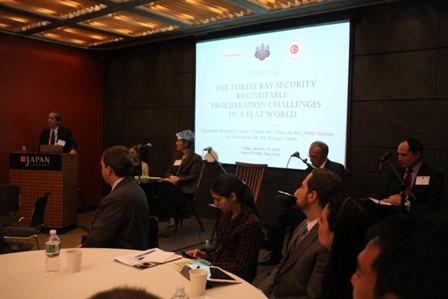
Ambassador Nishida gives opening remarks, together with Turkish and Polish co-hosts and Ellen Laipson from Stimson.
|
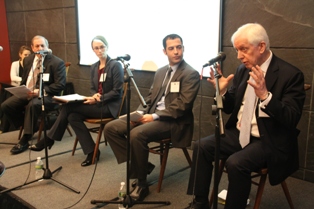
First panel. From left: George A. Lopez, Sheena Chestnut Greitens, Jonah Leff and Terence Taylor.
|
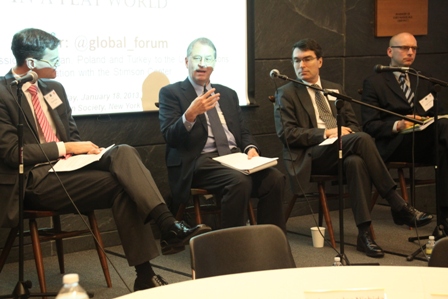
Second Panel. Moderator Brian Finlay, panelists David Albright, Martin Uden, and Hugh Griffiths.
|
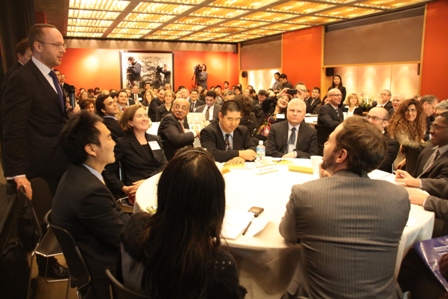
After the opening discussions by panelists, participants discussed amongst themselves, then shared their insights. |
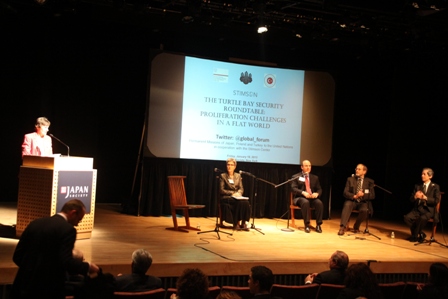
Angela Kane, UN High Representative on Disarmament Affairs, conveys the message from the Secretary-General. From left: Ms. Kane, Ms. Laipson, Juan Zarate, Duane Lindner, Ambassador Nishida.
|
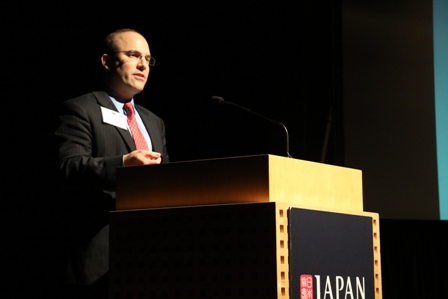
Keynote speaker Juan Zarate speaks to attendees about the five areas of innovation that could be used to tackle proliferation.
|
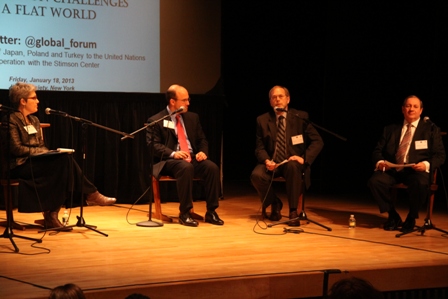
The keynote panel discussed the possibilities of UN Panel cooperation with the private sector and civil society. From left: Moderator Ms. Laipson, panelists Mr. Zarate, Mr. Lindner, Mr. Lopez
|
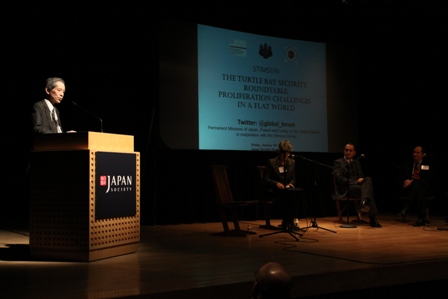
Ambassador Nishida gives closing remarks.
|
|
|
|

